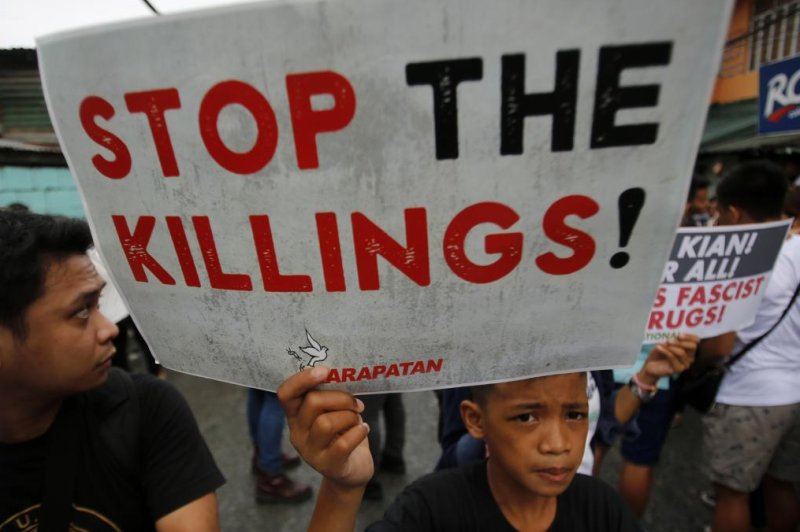Children in the Philippines have been deeply affected by the anti-drug campaign of President Rodrigo Duterte, researchers said in New York on Tuesday. Photo by Francis R. Malasig/EPA-EFE
NEW YORK, April 23 (UPI) -- Philippine President Rodrigo Duterte's war on drugs takes a toll on the country's poorest women and children, when a family's primary earner, usually a man, dies during police operations, a Filipino researcher said Tuesday.
Ica Fernandez, a Filipino development specialist who has been mapping data on the Philippine Drug War and its impact on the poorest households, said Tuesday the campaign is shattering families when fathers die and mothers must find a new role for themselves -- and sometimes a new husband.
"The recurring narrative is that, when father goes to the other life, the mother has to leave, transfer the household," Fernandez said at a forum on violence and policing at Columbia Journalism School.
Fernandez and Abigail Pangilinan, a Filipino development worker and urban planner, said they directly interviewed 22 families affected by the drug wars and coping with the loss of a family member.
"What happens is that the grandmother -- the paternal grandmother -- takes care of these children," Fernandez said, adding that among the families interviewed, two of the grandparents had already died because of disease.
"They could not take the strain of taking care of four to five children," she said, referring to the typical number of children in an impoverished urban family in the country.
Ronald Mendoza, dean of the Ateneo School of Government at Ateneo de Manila University, and a former United Nations official, said the anti-drug crackdown has a long-term and cross-generational impact on children. Children whose lives are affected by the violence are more likely to perform poorly or drop out of school.
The Philippine government provides no official data on child casualties, but a children's rights group in the country said there are 75 documented cases of minors killed as a result of the drug campaign and related violence, Mendoza said Tuesday.
The international development policy expert's database, which relies on news reports to estimate drug casualties, also reveals chilling details about the impact of the anti-drug campaign on minors. About 27,000 children under the age of 18 have surrendered to police, and anywhere from 18,398 to 32,395 children have been orphaned, losing one or both parents as a result of the war on drugs.
Mendoza's database estimates at a bare minimum a total of 7,029 individuals, mostly "very poor, mostly male," have died as a result of the crackdown from 2016 to 2018. They are also relatively young; 61 percent of the dead were below the age of 40, and 267 are women.
The occupations of the victims are harder to pin down, but Mendoza said he has managed to identify the occupations of 17 percent of the individuals, who worked in precarious jobs as jeepney dispatchers, street vendors, and garbage collectors. The majority of the people were killed in the context of "acknowledged police operations." "Unknown assailants" were responsible for 35 percent of the deaths.
Midway through his term in office, Duterte vowed during his Second State of the Nation address to engage in an "unremitting and unrelenting" fight against narcotics.
"I do not intend to loosen the leash in the campaign or lose the fight against illegal drugs. Neither do I intend to preside over the destruction of the Filipino youth," the president said in 2017.
These and similar declarations have led to policies where extrajudicial killings are becoming more common in areas outside Manila, the capital.
Fernandez and Pangilinan said by 2018 the crackdown had moved to different parts of the country, like Cebu in the central Philippines.
"This is something we can establish," the researchers said, adding the drug war is undermining social welfare programs for the poor.
The campaign could also be giving rise to cynical hostility toward victims. Fernandez said one local news report illustrated how hospital workers are reacting to the injured rushed to local facilities.
"You have nurses laughing while someone bleeds to death," she said. "You have cases where the poor are no longer seen as human. They're completely dehumanized."
The Philippine Supreme Court has not ruled Duterte's anti-drug campaign unconstitutional.















